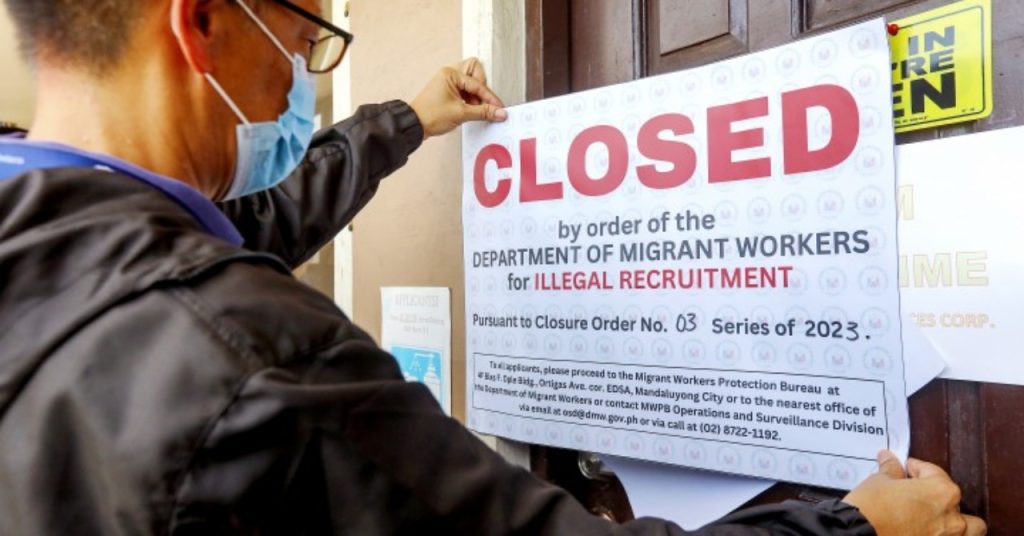You worked hard to prepare for a job—then a recruiter made promises they didn’t keep. Whether it’s excessive fees, a job that doesn’t exist, or a contract bait-and-switch, no one deserves to be taken advantage of. If you’re facing this kind of abuse, you can fight back. Here’s exactly how to report illegal recruiters or agency violations in the Philippines.
Also Read: Manila Economic and Cultural Office (MECO): PH Representative Office in Taiwan

Understanding What Counts as a Violation
Before you file a complaint, it’s important to know what counts as illegal or unethical behavior. Here’s what to watch for:
- Excessive or Unauthorized Fees – Agencies can’t charge more than what’s legally allowed.
- Misrepresentation – Lies about salary, working conditions, or the job itself.
- Contract Substitution – Changing contract terms after signing, without your consent.
- Failure to Deploy – When you’re left jobless despite paying fees and signing papers.
- Operating Without a License – If the agency isn’t accredited by the DMW or DOLE.
Tip: You can verify if an agency is licensed via the DMW website or DOLE’s online database. Alternatively, you can check out: Top POEA DMW-Accredited Agencies for Taiwan Jobs
Step-by-Step Guide: How to File a Complaint
- Gather Your Documents
You’ll need:
- Signed job contract (original + copy)
- Official receipts for any fees paid
- Screenshots or copies of chat logs, emails, or texts
- A copy of the agency’s license (if available)
Every piece of paper counts. These will help build your case.
- Decide Where to File Your Complaint
For Overseas Job Issues:
Department of Migrant Workers (DMW)
Covers complaints like:
- Overseas deployment failures
- Contract violations abroad
- Overcharging of placement fees
File at the DMW Adjudication Office or the nearest DMW regional branch.
For Local Job Issues:
Department of Labor and Employment (DOLE)
Handles:
- Local wage disputes
- Illegal recruitment for local jobs
- Contract misrepresentation
File at your nearest DOLE Regional Office.
For Criminal or Large-Scale Illegal Recruitment:
PNP-CIDG or NBI
If you suspect fraud, multiple victims, or a recruitment syndicate, report the case to:
- Philippine National Police – CIDG
- National Bureau of Investigation (NBI)
Reporting to the DMW: What to Expect
- Fill Out the Complaint Form
You can download this from the DMW website or get it at any branch. - Submit Your Complaint
Include all supporting documents. You’ll get a docket number for follow-up. - Attend Mediation or Conciliation
The DMW may schedule a meeting between you and the agency. - Adjudication
If no settlement is reached, a formal hearing takes place. A DMW officer will issue a decision based on your evidence. - Appeal if Needed
You can challenge the decision at the Office of the Secretary or appeal to the courts.
Reporting to DOLE: What to Expect
- Bring All Evidence to a DOLE Office
Especially if the recruitment was for local jobs. - Consult the Labor Desk
Staff will guide you whether to file with DOLE or refer the case to NLRC (for monetary claims). - Mediation First
DOLE often tries to settle things through mediation. - Escalation to NLRC
If the case involves unpaid wages or benefits, it may go to the National Labor Relations Commission.
When It’s Criminal: How to File Against Illegal Recruiters
Illegal recruitment isn’t just unethical—it’s a crime. Especially if:
- The recruiter has no license
- There are three or more victims
- It’s run by a group or syndicate
Where to File:
- PNP-CIDG – For fraud and large-scale recruitment
- NBI – Especially if there’s evidence of a recruitment scam ring
Note: The case may be endorsed to the Prosecutor’s Office. Penalties include fines and jail time for violators.
Legal Tips and Reminders
- Never pay cash under the table. Always ask for official receipts.
- Keep printed or screenshot copies of contracts and conversations.
- Never sign a contract you don’t understand. Ask questions, even if you feel pressured.
- Act quickly. You typically have up to 3 years to file labor claims, but criminal cases should be reported ASAP.
What Can Happen to the Agency?
If proven guilty, a recruitment agency may face:
- License Suspension or Cancellation
- Refund Orders – You may get your money back
- Blacklist Inclusion – They won’t be allowed to recruit again
- Criminal Charges – Fines, and jail time for the recruiter
Recent Updates
DMW Cracks Down on Illegal Recruitment
A surprise inspection led by Migrant Workers Secretary Hans Leo J. Cacdac exposed serious violations in recruitment agencies operating at Gedisco Center in Malate, Manila.
One suspected illegal recruiter was arrested, while two agencies—Femex Recruitment Agency and Superred Manpower Services—were immediately suspended.
Investigators uncovered unregistered personnel, unauthorized accommodations, and a scheme where licensed agencies conspired with illegal recruiters.
A Filipino worker recruited through Facebook was rescued, with the government now providing training, job placement assistance, and financial aid to help them recover.
The inspection highlights the government’s continued vigilance in protecting overseas Filipino workers from deceptive recruitment practices.
Frequently Asked Questions (FAQs)
Can I file a complaint while still working abroad?
Yes. You can file through the nearest Philippine Overseas Labor Office (POLO) or authorize someone in the Philippines to do it for you.
Do I need to pay to file a complaint?
Filing with DMW or DOLE is free, but lawyer’s fees (if needed) will cost extra.
What if the agency withholds my documents?
Include that in your complaint. It strengthens your case.
Will I be forced to attend mediation first?
In most cases, yes. It helps resolve disputes faster without going to court.
Final Thoughts
You’re not alone—and you don’t have to stay silent. If a recruiter or agency has wronged you, there’s a system in place to help. Know your rights, protect your documents, and file your complaint with confidence.
You worked hard for a better future. Don’t let anyone steal that from you.
